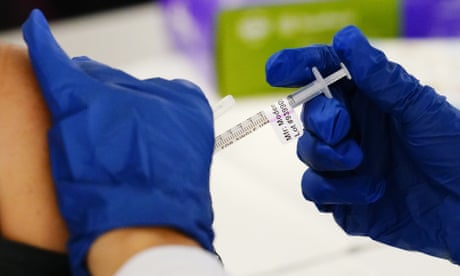- by foxnews
- 23 May 2025
Covid vaccines may soon be approved for young children in the US - will Australia do the same?
Covid vaccines may soon be approved for young children in the US - will Australia do the same?
- by theguardian
- 18 Jun 2022
- in news

Children under five in the US may soon be eligible for Covid vaccination after a recommendation by regulatory experts this week.
On Wednesday, a US Food and Drug Administration expert panel found that the Pfizer and Moderna Covid vaccines were safe for kids aged six months to five years old.
The panel voted unanimously that the benefits of the vaccines outweighed the risks in children aged six months to five years old for Moderna, and up to four years old for Pfizer. The recommendations for emergency use authorisation are still to be officially approved.
With authorisation in the US imminent, is Australia likely to follow suit?
Australian regulators will independently review data for the vaccines in children under five before considering any approval for use.
The Therapeutic Goods Administration announced on 13 May that it had begun evaluating Moderna's Covid-19 vaccine for use in young children. No such announcement has been made yet for Pfizer's vaccine.
Prof Alexandra Martiniuk, an epidemiologist at the University of Sydney, said no severe adverse events had been reported in trials of the Pfizer vaccine in children.
"Pfizer reports that their vaccine for Covid has 80% efficacy in preventing symptomatic Covid in children six months to five years old," she said. "They determined this in a trial enrolling 1,678 children of this age group and found the vaccine to be safe."
Prof Peter Richmond, head of the vaccine trial group at the Telethon Kids Institute, described the FDA recommendation as "a really promising step", adding it was likely both the Pfizer and Moderna vaccines would eventually be approved for children by the TGA.
"Both vaccines in the under-five age group appear to elicit an immune response that's similar to what's seen in adults," he said.
The federal health department said in a statement: "Should the TGA approve a product, after evaluation of a submission made by a vaccine sponsor, the Australian Technical Advisory Group on Immunisation will consider a recommendation on its use in Australia."
Richmond said it was too early to know whether Atagi would determine that all children should receive the vaccines.
If the Pfizer vaccine is approved in young children, it is likely to be administered in three doses.
"[Pfizer] has been recommended to be given as the first two doses three weeks apart, with a third dose of vaccine given two months after the second dose," Martiniuk said. Each of these three jabs would be one tenth of the adult dose.
Evidence suggests the third dose offered some protection against the Omicron variant "which in the younger children actually looked as good, if not better, than in the adults", Richmond said.
Moderna's vaccine for six-month- to five-year-olds consists of two shots administered four weeks apart. Each dose is one quarter of the adult dose.
Prof Robert Booy, an infectious diseases paediatrician at the University of Sydney, said there was a subset of young children who would benefit significantly from Covid vaccination, including those with problems affecting the heart, lungs and immune system.
"It would be fantastic to see vaccination of children with chronic medical problems at the very front of the queue, and to see them vaccinated as soon as possible," he said.
Children are at lower risk of severe Covid compared to older adults, and hospitalisations and deaths are rare. Deaths in children have constituted less than 1% of total Covid deaths globally, Martiniuk said.
Covid likely affects those under five more than primary school-age kids, she said. "Children can be unwell with Covid, and may be at risk of long Covid and, extremely rarely, multi-system inflammatory syndrome in children."
"A child in this age group having Covid is also likely to lead to requirements for time off for parents [or] caregivers."
Richmond said: "We vaccinate against other diseases where death is actually a generally rare event but we still want to have protection." He cited other infectious illnesses such as chickenpox, influenza and meningococcal disease.
"If you ultimately want to stop the family getting sick, then vaccination is a better way than risking infection."
Atagi last month released recommendations for a fourth Covid vaccine dose for at-risk populations, including people older than 65, Aboriginal and Torres Strait Islander people aged 50 and above, aged and disability care residents, and individuals who are severely immunocompromised.
These groups are encouraged to get the fourth dose four months after their previous jab.
The federal health department told Guardian Australia in a statement: "Studies have shown that healthcare workers have a greater risk of acquiring Sars-CoV-2 infection in community settings than through exposure at work. People in these groups without comorbidity have been demonstrated to retain good protection against severe illness from Sars-CoV-2 several months out from their first booster dose.
"Additional boosters are not currently recommended for people aged 16-64 years who do not have any conditions associated with increased risk of severe Covid-19, nor for people based on occupation, for example healthcare workers."
Richmond, whose team is currently conducting a clinical trial on Covid boosters, said: "It's clear with a fourth dose that you do get a rise in your antibody levels. How well that translates into protection against disease, particularly against some of these newer Omicron strains, is really still emerging.
"There's no question there is a benefit. It's just how long will that benefit last for," he said.
- by foxnews
- descember 09, 2016
United Airlines flight returns to Hawaii after concerning message found on bathroom mirror; FBI investigating
United Airlines Flight 1169 to Los Angeles returned to Hawaii after a "potential security concern" aboard the plane. The FBI and police are investigating.
read more


